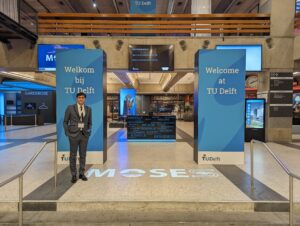 There is an ongoing shift within the maritime industry toward more sustainable and environmentally friendly energy sources and technologies. At the forefront of this transition are researchers like Dr. Andrea Coraddu, Associate Professor in the Department of Maritime and Transport Technology at TU Delft’s Faculty of Mechanical, Maritime, and Materials Engineering. His work centres on the modelling, optimisation, and analysis of hybrid and full electric marine energy systems.
There is an ongoing shift within the maritime industry toward more sustainable and environmentally friendly energy sources and technologies. At the forefront of this transition are researchers like Dr. Andrea Coraddu, Associate Professor in the Department of Maritime and Transport Technology at TU Delft’s Faculty of Mechanical, Maritime, and Materials Engineering. His work centres on the modelling, optimisation, and analysis of hybrid and full electric marine energy systems.
An instrumental figure in establishing the International Conference on Modelling and Optimisation of Ship Energy Systems (MOSES), Coraddu is now working with TU Delft OPEN Publishing to release a book of the conference proceedings from the recent event hosted in Delft.
Unconventional beginning
The journey to an academic career for Coraddu was perhaps a bit unconventional. At the age of 18, he joined the Italian Navy as an officer. “I was not interested in warfare, but instead I found myself drawn to the complex engineering of military vessels,” he said. Part of that experience involved the Navy funding his education, including a master’s in Naval Architecture and Marine Engineering. He then spent a year working onboard an Italian Navy submarine characterised by a diesel-electric propulsion system. “That was my first experience with a hybrid electric powertrain characterised by diesel engine, batteries, and electric motors,” said Coraddu. “I was fascinated and decided I wanted to know more.” From there, he started a PhD, beginning his academic career. Since then, he has always had an interest in complex engineering systems.
Sustainable ships
Focusing on the development of intelligent and sustainable energy systems for ships, Dr. Coraddu is at the forefront of the maritime energy transition. His research explores the design, integration, and control of the next generation of hybrid and fully electric marine energy systems. During the last decade, his work has been pivotal in enabling the optimal design and operation of sustainable ships. This involves investigating the potential of alternative fuels such as hydrogen, methanol, and ammonia, which stand as eco-friendlier replacements for traditional hydrocarbon-based fuels that have dominated shipping propulsion for centuries.
More recently, Coraddu’s focus has been on designing and controlling marine energy systems, which include electrochemical devices like batteries and fuel cells. This involves adding new layers of complexity to the design and control of hybrid and fully electric powertrains. Furthermore, his approach integrates the advantages of digital technologies and big data.
Scientific and societal challenges
The technologies described above are key to enabling sustainability and addressing scientific and societal challenges. As with electric cars there is a similar push to leverage batteries and fuel cells for maritime, but it is a complex task according to Coraddu. The latest advances in the field focus on the exploitation of data and raw information coming from the sensing networks that are usually installed on board a vessel. From a scientific standpoint, the challenges revolve around how to translate this raw data into actionable information, which links with advances in the field of artificial intelligence and machine learning.
From a societal point of view, Coraddu said the challenge is balancing cost and sustainability in proposed solutions. He pointed out that for every battery produced, one must consider the life cycle cost. “It is somewhat naive to consider full electric powertrains as zero emissions systems,” he observed. “While they are locally emission-free, the entire process from raw material extraction to dismantling has significant impacts. We need to improve this.” He stressed the importance of critically assessing the long-term sustainability of current technological solutions, which may not be as sustainable as initially thought.
Conference milestone
In 2017, a group of people enthusiastic about research in maritime sustainability gathered for a two-day symposium at EPFL in Switzerland. According to Coraddu, they recognised the lack of a conference addressing the specific problem of modelling and optimising ship energy systems. So some of them came together and established MOSES, the International Conference on Modelling and Optimisation of Ship Energy Systems. The first edition was hosted at Strathclyde University in Glasgow, where Coraddu was working at the time. He came to TU Delft in 2020, where he recently hosted the 4th edition of MOSES. “It was a great success, mainly because of the support of the colleagues at the TU Delft Aula who provided a great deal of help with hosting the conference,” he said.
For the first time, Coraddu organised MOSES to ensure that its publications are accessible on Scopus, each with a unique Digital Object Identifier (DOI). “This represented a major milestone for the conference. Previously, the proceedings were published without DOIs. The presence of DOIs is a crucial factor for academics when deciding whether to submit their work, as it significantly influences the visibility and credibility of their research,” he said. The 24 conference papers from the 4th edition of MOSES will be published online by TU Delft OPEN Publishing and they will also be translated into an open access book of proceedings early next year.
Open benefits academics
In addition to being a service to society, Coraddu said open access publishing is beneficial to academics. “It gives you the possibility of being more visible and allows other colleagues to access your work without paying or using less ethical shortcuts. I’m so pleased that TU Delft has a very strong open access policy. I think this is one of the TU Delft’s great core values, to make knowledge available to everyone.”
